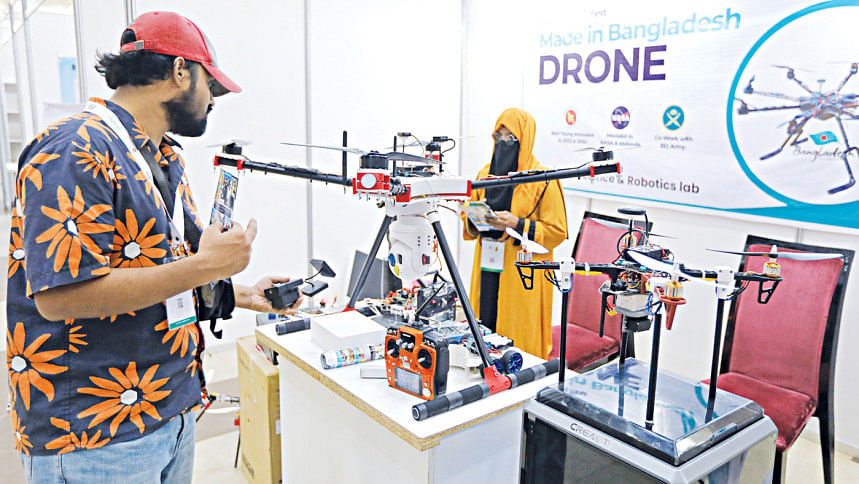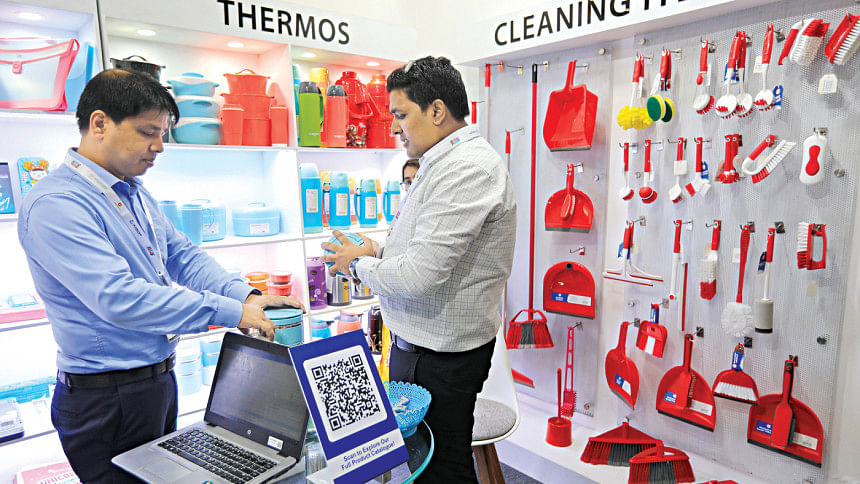Bangladesh showing export potential amid economic headwinds

Bangladesh is showing its industrial capabilities and export resilience even amid economic uncertainty and political transition, according to speakers.
They praised local entrepreneurs for that, saying the business community is transforming the economy through perseverance and innovation.
"You have built exceptional products that reflect the true potential of our nation," said Commerce Adviser Sk Bashir Uddin while inaugurating the two-day "Meet Bangladesh Exposition" at International Convention City Bashundhara.
Organised by the commerce ministry's Export Competitiveness for Jobs (EC4J) Project, the event features over 120 local exhibitors and more than 25 foreign buyers from countries including Singapore, Libya, Colombia, Algeria, the UAE, India, Malaysia, Bhutan, and the Maldives.
At the programme, the adviser, referring to the local business community, said, "Your success showcases extraordinary dedication in the face of global competition."

Uddin pointed to ongoing policy reforms for improving the ease of doing business, including the introduction of a national single window -- an integrated digital platform to simplify trade, enhance transparency, and reduce transaction costs.
"Our priority is job protection and creation," he said. "To sustain growth, we must continue to evolve."
Despite recent economic pressures, the adviser said that Bangladesh has maintained a steady export performance and is expected to benefit from falling operational costs in the near future.
Positioning the exposition as a curtain-raiser for the upcoming International Investment Summit, Uddin invited global investors to explore the country's industrial sectors.
"Our ministry is not just a regulator. It is your facilitator, analyst, and partner," he said.
"We are with you, for you, and beside you. I remain at your service to support your pursuit of excellence," added the adviser.
Sheikh Mohammad Abdur Rahman, joint secretary at the commerce ministry and deputy director of the EC4J project, said the expo highlights Bangladesh's industrial development, innovation, and growing focus on sustainability and environmental standards.
Welcoming international buyers and delegates, he said that many foreign buyers had already visited local factories and responded positively.
"Your enthusiasm was encouraging, and today's inauguration will further deepen your understanding of our capabilities," he said.
Rahman hoped that Bangladesh would attract greater interest from international markets, citing the country's reputation for quality and efficiency.
He also thanked development partners for their continued support.
Rahman added that the exposition, completed in just five months despite being planned for a year, was a source of national pride.
"This is more than a business event, it is a moment of national pride," he said.
Suhail Kassim, senior operations officer and acting country director of the World Bank, reaffirmed the bank's commitment to supporting Bangladesh in expanding industrial competitiveness beyond the readymade garment sector.
He cited initiatives like the Private Investment and Digital Entrepreneurship (PRIDE) project, which promotes economic zones and technology parks, as well as the launch of a country-specific private sector diagnostic to guide strategic reforms and export diversification.
"The World Bank remains committed to supporting SMEs, strengthening value chains, and driving long-term growth. We are proud to be part of Bangladesh's journey," he said.
Shamim Ahmed, president of the Bangladesh Plastic Goods Manufacturers and Exporters Association, called for increased foreign investment in the SME sector, which contributes roughly 30 percent of GDP.
Ahmed emphasised the growth potential of the plastic industry, noting it could expand by 20 percent annually with proper investment and policy backing.
The exposition will remain open from 10am to 7pm daily. More than 1,000 local buyers are also attending to it, creating a platform for manufacturers to connect with global investors and industry stakeholders.
The expo includes guided factory visits, breakout sessions, and workshops led by business leaders and sector experts to encourage dialogue and foster partnerships across emerging export sectors such as medical and personal protective equipment, leather goods, footwear, plastics, and light engineering.

 For all latest news, follow The Daily Star's Google News channel.
For all latest news, follow The Daily Star's Google News channel. 



Comments